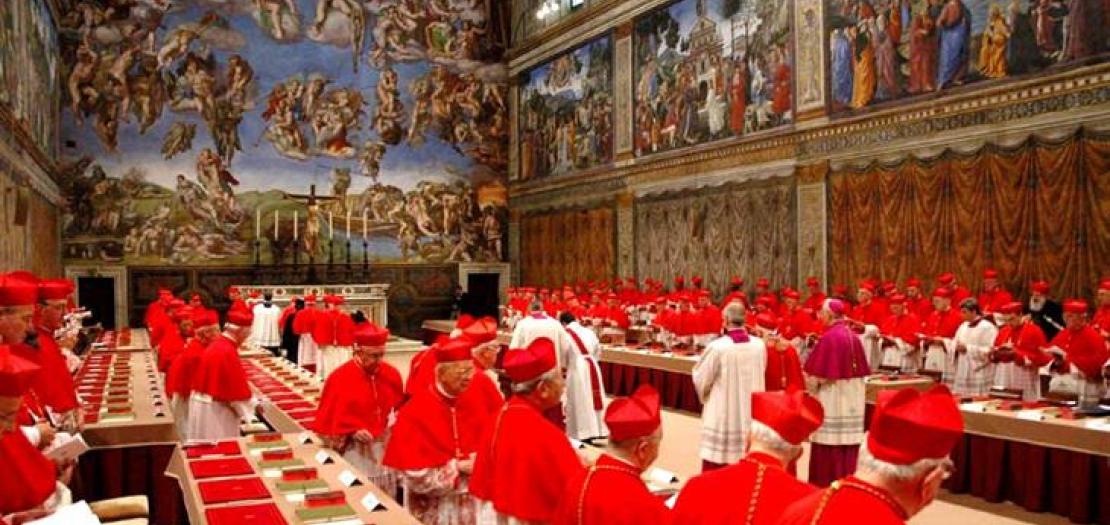Issued by the Catholic Center for Studies and Media - Jordan. Editor-in-chief Fr. Rif'at Bader - موقع أبونا abouna.org
The Vatican on these historic days
The Vatican and the Catholic Church conclude the nine-day of mourning marking the passing away of Pope Francis effective the funeral day until Sunday, May 4. Yet, the end of mourning does not mean the end of Pope Francis' legacy, as the Church starts to reflect on the legacy he left behind and the things he taught as teaching is the fundamental characteristic of a bishop in general, and of a pope in particular. This is why we used to see him emerge every Wednesday to deliver the catechesis, which is considered the bishop's primary mission. This, of course, includes the liturgical, pastoral, and administrative tasks entrusted to the successor of Saint Peter, the head of the Catholic Church and the Holy See.
Pope Francis leaves behind a great legacy after 12 years of his pontificate and services during which he undertook 47 apostolic trips abroad, including the preparations and meetings he held with millions of people around the world relevant to these papal visits. I recall that at the beginning of his pontificate, he met with journalists in March 2013, two days after his election. I was honored at the time to be there, during which he said, "I want it to be a poor Church for the poor." He added, "Return to the roots of true media, so that it may be a servant of goodness, truth, and beauty." Pope Francis left this Earth, leaving behind a great legacy, while striving all the time to make the Church poor while welcoming the poor.
With the end of the mourning period, the process of looking to the future begins with the election of a successor to Pope Francis, namely the 267th successor to Saint Peter. When we read this number, we are talking about more than 2,000 years of the Church's presence in this world, encompassing its spirituality, administration, and the entire moral voice it now represents worldwide.
On Monday, the Vatican employees working in the area abutting the Sistine Chapel, where the elections will take place, will take an oath of secrecy to maintain confidentiality no matter what they hear or get apprised of under the penalty of excommunication. The cardinals will first meet on Wednesday for a Holy Mass referred to as 'the Mass and prayers for the election of the Pope' to be presided by Dean of the College of Cardinals Cardinal Giovanni Battista Rei, who had earlier presided the Pope's funeral. Then, they enter the Sistine Chapel, where the first round of voting will take place on Wednesday afternoon, with the participation of 135 cardinals under the age of 80 who are eligible to vote.
From this premise, we address to the Arab and international media indicating that there are no nominations for the papal election, as we are not discussing parliamentary or presidential elections, political base, election manifesto, or electoral propaganda. We are talking about the logic of prayer. In the first place, the entire Church prays for the election of a successor to Saint Peter. Then, this Pope will follow ecclesiastical tradition and, of course, serve the Church with all his moral, physical, and intellectual strength he has. Above all, he will use the spiritual strength he draws from prayer to lead the people of God in the Catholic Church.
We plead with God that these elections will proceed smoothly, and that a new shepherd will emerge to be prepared to serve and to continue the procession of Saint Peter's ship, which sails through the world of today despite the turbulent waves. In this context, we recall the Jubilee theme chosen by Pope Francis for this Jubilee Year 2025--when he opened its Holy Doors on Christmas Eve--which he intended to be, "Pilgrims of Hope." The drawing depicts four people clinging to one another and holding the Cross, whose base is the anchor of salvation amidst a world represented by calm waves of the sea which frequently turn violent.
We pray to God that the ship of Peter may always sail, at all times of its history, to the shores of safety, security, and faith.


